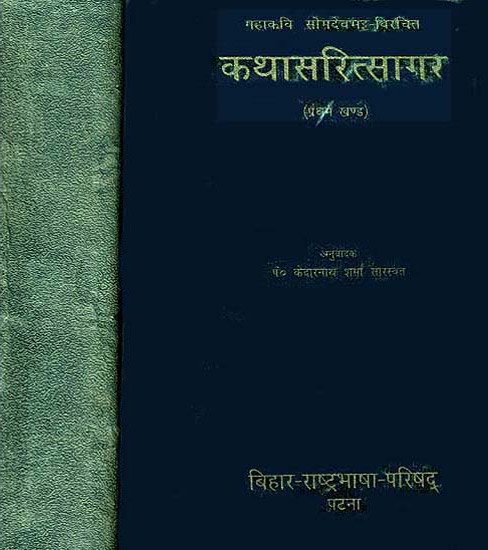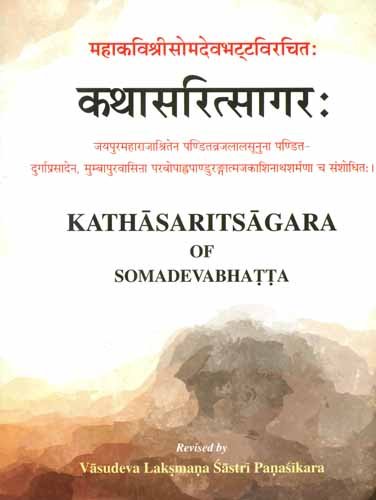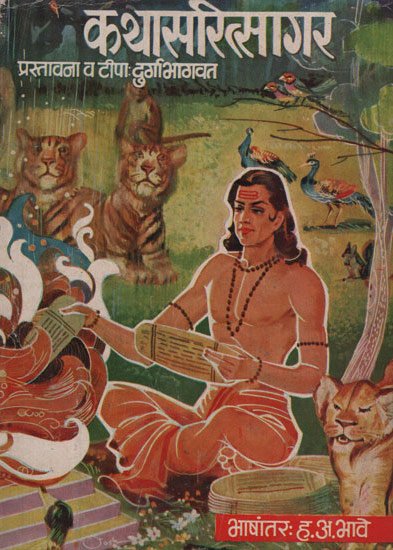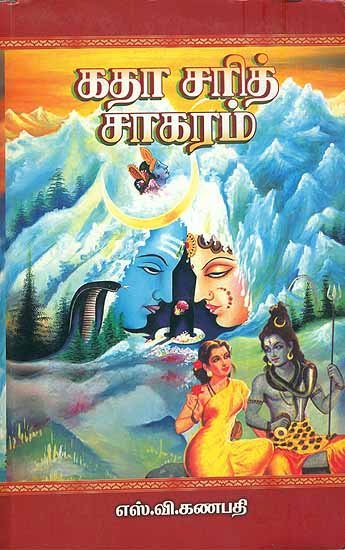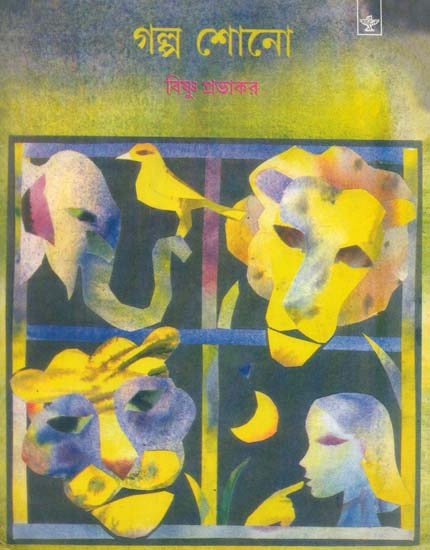Kathasaritsagara [sanskrit]
by C. H. Tawney | 2014 | 226,424 words | ISBN-13: 9789350501351
The Sanskrit edition of the Kathasaritsagara referencing the English translation and grammatical analysis. Written by Somadeva and dating from the 12th century, the Kathasaritsagara (or Katha-sarit-sagara) represents an epic legend narrating the adventures of Naravahanadatta as he strives to become the destined emperor of the Vidyadharas. Alternative titles: (Kathāsaritsāgara, कथासरित्सागर, Kathā-sarit-sāgara)
Verse 10.6.210
इत्य् उक्तवति याते ऽस्मिन् वणिजि द्वारपट्टकम् ।
विपणीतो गृहीत्वांसे दासो द्रष्टुम् अगान् नटम् ॥ २०९ ॥
ity uktavati yāte 'smin vaṇiji dvārapaṭṭakam |
vipaṇīto gṛhītvāṃse dāso draṣṭum agān naṭam || 209 ||
The English translation of Kathasaritsagara Verse 10.6.210 is contained in the book The Ocean of Story by C.H. Tawney. This book is available online or you could buy the latest edition:
Read online Buy now! The English translation by C.H. Tawney (2014)
Glossary of Sanskrit terms
Note: This extracts Sanskrit terms and links to English definitions from the glossary, based on an experimental segmentation of verse (10.6.210). Some terms could be superfluous while some might not be mentioned. Click on the word to show English definitions.
Uktavat, Uktavati, Yat, Yata, Yati, Idam, Vanij, Dvarapatta, Kah, Vipani, Vipanin, Itah, Ita, Grihitva, Amsa, Dasa, Aga, Nata,
Analysis of Sanskrit grammar
Note: this is an experimental feature and only shows the first possible analysis of the Sanskrit text (Kathasaritsagara Verse 10.6.210). If the system was successful in segmenting the sentence, you will see of which words it is made up of, generally consisting of Nouns, Pronouns, Verbs, Participles and Indeclinables. Click on the link to show all possible derivations of the word.
- Line 1: “ity uktavati yāte 'smin vaṇiji dvārapaṭṭakam ”
- Cannot analyse ity*uk
- uktavati -
-
uktavat (noun, masculine)[locative single]uktavat (noun, neuter)[locative single]√vac -> uktavat (participle, masculine)[locative single from √vac class 2 verb], [locative single from √vac class 3 verb]√vac -> uktavat (participle, neuter)[locative single from √vac class 2 verb], [locative single from √vac class 3 verb]√vac -> uktavatī (participle, feminine)[vocative single from √vac class 2 verb], [vocative single from √vac class 3 verb]
- yāte' -
-
yāt (noun, masculine)[dative single]yāt (noun, neuter)[dative single]yāta (noun, masculine)[locative single]yāta (noun, neuter)[nominative dual], [vocative dual], [accusative dual], [locative single]yātā (noun, feminine)[nominative dual], [vocative single], [vocative dual], [accusative dual]√yā -> yāta (participle, masculine)[locative single from √yā class 2 verb]√yā -> yāta (participle, neuter)[nominative dual from √yā class 2 verb], [vocative dual from √yā class 2 verb], [accusative dual from √yā class 2 verb], [locative single from √yā class 2 verb]√yā -> yātā (participle, feminine)[nominative dual from √yā class 2 verb], [vocative single from √yā class 2 verb], [vocative dual from √yā class 2 verb], [accusative dual from √yā class 2 verb]yāti (noun, masculine)[vocative single]yāti (noun, feminine)[vocative single]
- asmin -
-
idam (pronoun, masculine)[locative single]idam (pronoun, neuter)[locative single]
- vaṇiji -
-
vaṇij (noun, masculine)[locative single]
- dvārapaṭṭa -
-
dvārapaṭṭa (noun, masculine)[compound], [vocative single]
- kam -
-
ka (noun, neuter)[adverb], [nominative single], [accusative single]ka (noun, masculine)[accusative single]kaḥ (pronoun, masculine)[accusative single]
- Line 2: “vipaṇīto gṛhītvāṃse dāso draṣṭum agān naṭam ”
- vipaṇī -
-
vipaṇi (noun, feminine)[compound], [adverb], [nominative dual], [vocative dual], [accusative dual]vipaṇin (noun, masculine)[compound], [adverb], [nominative single]
- ito* -
-
itaḥ (indeclinable)[indeclinable]ita (noun, masculine)[nominative single]√i -> ita (participle, masculine)[nominative single from √i class 2 verb]√i (verb class 2)[present active third dual]
- gṛhītvā -
-
gṛhītvā (indeclinable)[indeclinable]√grah -> gṛhītvā (absolutive)[absolutive from √grah]
- aṃse -
-
aṃsa (noun, masculine)[locative single]
- dāso* -
-
dāsa (noun, masculine)[nominative single]
- draṣṭum -
-
√dṛś -> draṣṭum (infinitive)[infinitive from √dṛś]
- agān -
-
aga (noun, masculine)[adverb], [accusative plural], [ablative single]aga (noun, neuter)[adverb], [ablative single]√gā (verb class 2)[imperfect active third single], [imperfect active third plural], [aorist active third single]√gā (verb class 3)[aorist active third single]√gā (verb class 2)[imperfect active third single], [imperfect active third plural]
- naṭam -
-
naṭa (noun, masculine)[adverb], [accusative single]naṭā (noun, feminine)[adverb]
Other editions:
Also see the following editions of the Sanskrit text or (alternative) English translations of the Kathasaritsagara Verse 10.6.210
Kathasaritsagar
by Kedarnath Sharma Saraswat (2005)
The Only Edition with the Sanskrit Text and its Hindi Translation (An Old and Rare Book) Set of 3 Vol.
Buy now!
Kathasaritsagara of Somadeva Bhatta (Sanskrit Text Only)
by Vasudeva Laksmana Sastri (2013)
Katha Sarit Sagar in Marathi
by H. A Bhave (1995)
Set of 5 Volumes; Published by Varada Books, Pune. 2256 pages (Throughout B/W Illustrations).
Buy now!
Katha Sarit Sagara (Tamil)
by S. V. Ganapati (எஸ். வி. கணபதி) (2014)
[கதா சரித் சாகரம்] Published by Alliance Publications.
Buy now!
Galpa Shono
by Abhijit Chattopadhyay (2014)
[গল্প শোনো] Galpa Shono: Bengali Translation of 'Suno Kahani From Katha Sarit Sagar'; 9788126015436; Published by Sahitya Akademi, Delhi.
Buy now!Preview of verse 10.6.210 in Bengali sript:
ইত্য্ উক্তবতি যাতে ঽস্মিন্ বণিজি দ্বারপট্টকম্ ।
বিপণীতো গৃহীত্বাংসে দাসো দ্রষ্টুম্ অগান্ নটম্ ॥ ২০৯ ॥
![Kathasaritsagara [sanskrit] - book cover](/uploads/a/Katha-Sarit-Sagara.jpg)
